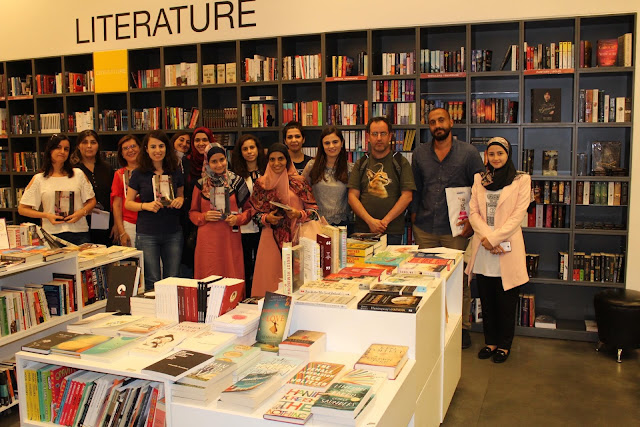Bookoholics' 12 Genre 2018 Theme, Book # 5 (Philosophy) Papa Sartre: Ali Bader & Book # 6 (Poetry) The Garden of the Prophet: Gibran Khalil Gibran
Lubna Maaliki & Hoda Marmar
On the 9th of May, 2018, Bookaholics met at the Arab Network Library in Saifi and discussed Papa Sartre بابا سارتر for the Iraqi author Ali Bader and Garden of the Prophet for the renown Gibran Khalil Gibran.
The meeting started with a heated debate about Ali Bader’s philosophical novel which relies heavily on four main premises: Jean-Paul Sartre, Existentialism, Absurdism, and irony. Why the irony? It is to illustrate how meaningless and hollow are the coffeeshops’ and pubs’ philosophers, especially those of the 1960s and 1970s in Baghdad.
"كانت ثقافته شفاهية , كانت ثقافة تستند إلى الكلام لا إلى الكتابة , كما كانت ثقافة أغلب مثقفي جيله وهي : الجلوس في المقاهي والتحدّث بصورة لا نهائية على طق الدومينو وشجير النارجيلة صباحًا , الرقود في السينمات متراخين على الكراسي الخلفية عصرًا , وفي المساء السكر والعربدة في الملاهي والبارات و الأماكن العامة . الكتب لا تُقرأ منها إلا عناوينها , و لا يعرف أحد منها إلاّ العروض المبسترة في الصحف والمجلات الأدبية , ومع ذلك ممالك تبنى في الكلام , وممالك تهدّ , عروض يهزها الكلام ويخلخلها , ومدن يصنعها الكلام ويؤسسها , وليس هنالك في واقع الأمر من كان بإمكانه أن ينفّذ ما يقول أو من كان بإمكانه أن يصلح واقعًا , او حتى يفهم واقعًا."
At first, the literary genre of philosophy and philosophical fiction were highlighted, followed by the difference between existentialism, nihilism, and absurdism. The narrator is asked to write about the life of a so-called philosopher and find out why he passed away through asking around about him and consulting unreliable sources of hearsay and written notes.
"إن الغثيان والشعور بعدمية الحياة – لا بعدمها – ( لم يفرّق المثقفون العراقيون آنذاك بين العدمية والعدم ) هو سبب انتحار الفيلسوف."
The novel has a satirical undertone to it, and its themes especially appeal to fans of Sartre and Camus. A common remark made by the readers was that there was some redundancy especially at the middle of the novel which started with a kick then slowed down a bit. This is understandable when one learns that this was Bader’s first novel. The main ideas are somewhat controversial; yet, the context of the novel, Baghdad in 1960s is somehow unfathomable to the readers, so it was quite interesting to learn about that period and walk through the alleyways of the city, while at the same time, there is no background understanding of it in the readers’ minds to compare it with.
The meeting proceeded with talking about the genre of Poetry before discussing Gibran’s The Garden of the Prophet, which was first published in 1975. Preceding it was Gibran’s infamous The Prophet (1923).
The Garden of the Prophet narrates Al Mustafa's discussions with nine disciples following his return after a long absence. Different topics are introduced as sequential discourses between Al Mustafa and his disciples, covering a wide range of subjects giving out clues on how people can lead a happy and illumined life.
In this book of poetic prose, the Prophet comes back after (12) years of absence, like a biblical prophet. He is widely celebrated and immensely missed. The villagers all gather around him thirsty for his knowledge. He spends (40) nights and days in solitude in his garden - similarly to the days Moses spent away from people - and later picks some disciples - as a proper prophet would - and tells them about life and love and God and beauty. However, the disciples at one point go back to their daily routines, and the Prophet becomes a like a tree burdened by its fruits which nobody wants to feast on. Thus, it is time for him to leave and embark on another journey.
Readers agreed that even though it is short and can be read within a few hours, yet, the book is dense with Al Mustafa's vivid imagery and allegories, which are powerful and still relatable to this day since they tackle mankind's deepest motivating fears and desires.
One remarkable passage that relates to our days and to that of our ancestors:
"I go, but if I go with a truth not yet voiced, that very truth will seek me and gather me, and again shall I come."
“Pity the nation that is full of beliefs and empty of religion.
Pity the nation that wears a cloth it does not weave
and eats bread it does not harvest.
Pity the nation that acclaims the bully as hero,
and that deems the glittering conqueror bountiful.
Pity a nation that despises a passion in its dream,
yet submits in its awakening.
Pity the nation that raises not its voice
save when it walks in a funeral,
boasts not except among its ruins,
and will rebel not save when its neck is laid
between the sword and the block.
Pity the nation whose statesman is a fox,
whose philosopher is a juggler,
and whose art is the art of patching and mimicking
Pity the nation that welcomes its new ruler with trumpeting,
and farewells him with hooting,
only to welcome another with trumpeting again.
Pity the nation whose sages are dumb with years
and whose strongmen are yet in the cradle.
Pity the nation divided into fragments,
each fragment deeming itself a nation.”





Comments
Post a Comment